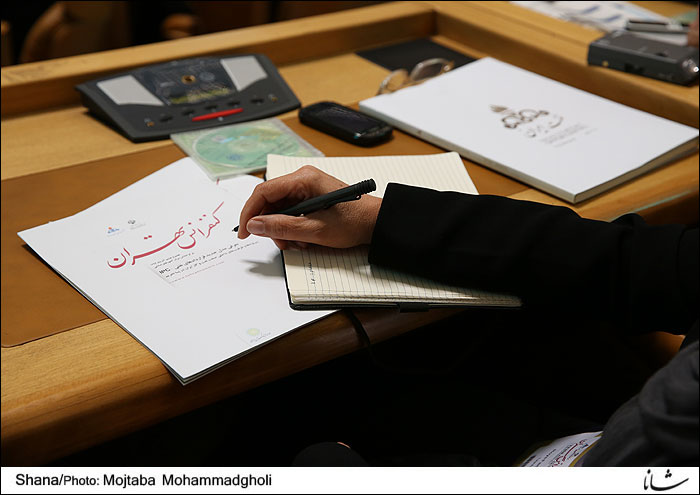According to Shana reports, NIOC Managing Director Rokneddin Javadi on Saturday met representatives from oil giants including Total, Lukoil, Socar, and Petronas on the sidelines of the two-day event.
The representative of the French energy giant Total met with Javadi to discuss future energy ties under the new oil contract Iran introduced on Saturday.
President Middle East and North Africa of Total Exploration and Production Stephane Michel met with the NIOC CEO. After the meeting, Michel told Shana, “We are here to attend the conference for new IPC. We were working in this country for the time we chat because of the sanctions."
Saying that Total will review the options exactly to see what they can do in Iran, he added, “In the meantime we are here to listen. Total is a big oil and gas company; we can do oil; we can do gas."
The IPC took two years to be devised by the Iranian Petroleum Ministry and be endorsed by the President Hassan Rouhani administration.
The projects introduced under IPC are hoped to meet a part of Iran's need for developing its oil and gas industry, said Mehdi Hosseini, secretary of the conference and the official in charge of devising the new contract terms at Iran's Ministry of Petroleum.
IPC is replacing buyback deals. Under a buyback deal, the host government agrees to pay the contractor an agreed price for all volumes of hydrocarbons the contractor produces.
But under the IPC, National Iranian Oil Company (NIOC) will set up joint ventures for crude oil and gas production with international companies which will be paid with a share of the output.
Also Russia’s second major oil and gas company Lukoil said it has taken the opportunity of taking part in the Iran Petroleum Contracts (IPC) Conference in which new oil and gas contract models are unveiled.
“The event has been useful in introducing the new contacts,” Dmitry Timoshenko, the company’s vice-president of development for geological exploration and production, told Shana on the sidelines of the conference on Saturday.
“We are studying the contract model and will make our decision,” he said following a meeting earlier with Javadi.
In September, Lukoil’s CEO Vagit Alekperov negotiated with Iranian Petroleum Minister Bijan Zangeneh and expressed the Russian firm’s readiness to enter into an initial agreement with Iran in the areas of enhanced oil recovery, exploration and crude oil extraction.
Lukoil’s cooperation with Iran was disrupted due to US-led sanctions against Tehran which forced the Russian oil major to abandon the Anaran oil project in 2011.
Lukoil and the NIOC officials have held negotiations about the Russian company’s resumption of the project to develop the Azar field located in Iran’s Anaran block.
The Russian company and Norway's Statoil started developing the Anaran oil field in 2003 but had to pull out in 2011 after the US and Europeans intensified sanctions on Iran.
Iran shares Azar with neighboring Iraq which calls it Badra.
Meantime, the NIOC managing director said China's oil giant Sinopec may return to phase II of Yadavaran oilfield.
"Restoration of cooperation with Sinopec in Yadavaran Oilfield is a possibility," Roknoddin Javadi told reporters on Saturday.
Speaking on the sidelines of a conference in Tehran to introduce Iran's new oil contract model (IPC), Javadi said NIOC is in talks with Indian contractors for developing Farzad B Field.
Asked whether international oil firms are looking to step in Iran's newly introduced projects under IPC contracts, he said, "Sure they are, so long as investment opportunities in Iran's oil industry give them numerous options so they will not have to put all their eggs in one basket."
Based on the reports, the NIOC chief also met twice with senior officials from the Azeri company Socar during which both sides indicated their interest in bolstering mutual energy interaction.
Last but not least, a high-profile delegation from Malaysia's Petronas held talks with the chief of NIOC to discuss future energy ties.
"Petronas executives indicated the company's interest to expand its ties with NIOC," said Javadi.
Representatives from 137 petroleum heavyweights including Royal Dutch Shell, Total and Lukoil, to name a very few, attended the conference.
The representatives came from 45 countries. Totally, 335 companies have participated in the two-day event to be the first to know about the contract terms.
A follow-up conference will be held in London on February 22-24 after the IPC event in Tehran.
In the wake of nuclear deal reached last July, Iran has been receiving high-ranking officials and corporate executives of major companies including from Germany, Spain, Austria, Italy, and France to discuss new cooperation ventures.
Iranian Minister of Petroleum Bijan Zangeneh has said that Iran welcomes foreign investment in its energy industry, but stresses technology transfer by foreign partners in the new contracts.
In the run-up to the conference, he said there is the prospect of entering oil investment deals to the tune of 30 billion dollars under the new contracts on the sidelines of the conference.
“A section of our oil industry’s challenges will be settled by the new contract models,” he told Shana on the verge the IPC Conference.
His advisor, Mansour Moazzemi, has said that the new oil contracts to be introduced are drawn on win-win terms considering tough competition for the development of the region’s oil fields.
“The new IPC model is on a win-win basis which secures the interests of both parties to the contracts,” he said.
By Touraj Shiralilou, and Abbas Hajihashemi


Your Comment